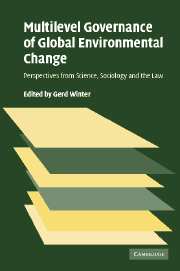 Multilevel Governance of Global Environmental Change
Multilevel Governance of Global Environmental Change Book contents
- Frontmatter
- PREFACE
- Contents
- List of figures
- List of tables
- Notes on contributors
- List of abbreviations
- 1 Introduction
- PART I Earth system analysis
- PART II Society and institutions of global; environmental change
- PART III Self-regulation of industry and the law
- PART IV The potential of the state
- 9 The diffusion of environmental policy innovations
- 10 Process-related measures and global environmental governance
- 11 The impact of the USA on regime formation and implementation
- 12 Transnational bureaucracy networks: a resource of global environmental governance?
- PART V The potential of world regions
- PART VI Formation and implementation of international regimes
- PART VII Improving the instruments of global governance
- PART VIII Fundamental concepts of institutionalising common concern
- Index
12 - Transnational bureaucracy networks: a resource of global environmental governance?
The case of chemical safety
Published online by Cambridge University Press: 04 May 2010
- Frontmatter
- PREFACE
- Contents
- List of figures
- List of tables
- Notes on contributors
- List of abbreviations
- 1 Introduction
- PART I Earth system analysis
- PART II Society and institutions of global; environmental change
- PART III Self-regulation of industry and the law
- PART IV The potential of the state
- 9 The diffusion of environmental policy innovations
- 10 Process-related measures and global environmental governance
- 11 The impact of the USA on regime formation and implementation
- 12 Transnational bureaucracy networks: a resource of global environmental governance?
- PART V The potential of world regions
- PART VI Formation and implementation of international regimes
- PART VII Improving the instruments of global governance
- PART VIII Fundamental concepts of institutionalising common concern
- Index
Summary
Introduction
Chemicals are ubiquitous. They are virtually used everywhere; pesticides and fertilisers help to increase agricultural production and biocides assist in the combat of transmittable diseases, to name just two of the most important uses of chemicals. The economic importance of chemicals becomes obvious if a few facts are considered. Approximately 8,100,000 substances are commercially available; annually, the chemical industry manufactures goods worth US $1,600 billion; in 2002, trade in chemicals accounted for 10.5 per cent of world merchandise trade. But the ubiquitous use has a downside. The complex production processes and the unwanted harmful effects on the environment and human and animal health lead to a ‘control problem’.
Catastrophes such as the accidents in Seveso, Bhopal, and Schweizerhalle are rather drastic examples of the dangers arising from the production of chemicals. The hazards of incremental pollution become clear in the case of the Minamata disease. Methyl mercury was discharged by a chemical plant into Minamata Bay and accumulated in fish which later was consumed by fishermen and their families. However, serious as such accidents and incremental pollution as results of the production processes certainly are, the bulk of environmental risks from chemicals is related to the placing on the market, the use, and the disposal of chemicals in the form of products. Whilst risks from production processes widely are of local or regional concern, risks from products have created a truly global problem. One example is the long-range transport of persistent organic pollutants (POPs). Many POPs, i.e.
- Type
- Chapter
- Information
- Multilevel Governance of Global Environmental ChangePerspectives from Science, Sociology and the Law, pp. 305 - 330Publisher: Cambridge University PressPrint publication year: 2006
- 3
- Cited by


